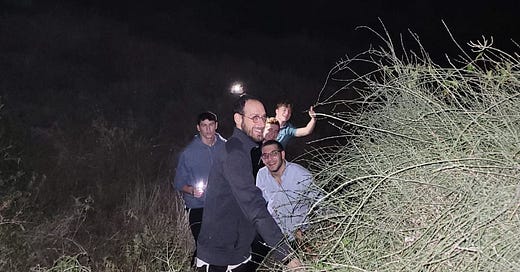Dear Healthy Jew,
The Healthy Jews of Lev Hatorah walked up the street in silence, heading out to the dark countryside. We passed Rabbi Shimshon and another student, deep in conversation on a bench, and smiled at them awkwardly as we shuffled by. No words were exchanged.
It was hard work letting go of our regular Healthy Jewish banter and just walking together in silence. We acutely felt each other’s presence, with no words to defuse the intensity. Then a dog barked and we all jumped; noise is deafening from inside silence.
After the paved street turned to the dirt trail, we sat in a circle of silence. The silence thickened every minute.
Walking and sitting in silence, we found, is both precious and terrifying, for the same reason: we directly experience ourselves and the world. Silence blocks words from smoothing things over or changing the subject, and rejects all the familiar distractions that remove us from reality. We’re deeply aware of the innocent presence of a friend, even our own breathing. We face ourselves, for better and for worse.
The impetus for finding Healthy Jew Silence was studying together the Rambam’s (Maimonides) first specific proactive suggestion in Hilchos Deos (Laws of Character Traits).
Here’s just the beginning of the ironically lengthy presentation:
A person should always do a lot of silence, only talking about wisdom or necessities. They told about Rav, the student of the Holy Rabbi [Yehuda Hanasi], that he never spoke empty words his whole life, the words that are most people’s speach.
Even for necessities a person shouldn’t speak many words. As the Sages instructed, “Anyone who speaks a lot will come to sin.” They also said, “I didn’t find anything better than silence for the body.”…1
The Rambam isn’t merely stacking sources that discourage idle chatter, but, as he makes clear in the opening phrase, is instructing to actively “do silence,” and do lots of it.
My teacher, of blessed memory, often taught the power of silence and the limitations of words, explaining how Moshe’s (Moses) claim to God that “I’m heavy of speech” wasn’t shirking the job of leading the Jews out of Egypt but the truth of a man who lived in the realm of silence.
Silence is difficult to understand and describe, because it’s about who we are, beyond what we do with words and actions. During one particularly nuanced talk about silence, my teacher commented, “You probably wonder what I’m doing talking and talking about silence.”
He would often pause in the middle of his lectures, sometimes for many long seconds. When someone showed him a recording device that automatically paused for quiet spaces, he retorted that they’ll miss the most important parts.
To discover and know silence, we must cultivate it slowly and purposely, devoting time each day to sit, walk, lie, or stretch in silence. There are many methods and traditions for finding silence; all are good when used for the purpose of purposeful wellness.
Silence is the core of what I call being well, the third pillar of healthy Jewish living (together with eating well and moving well).
Being well isn’t about altered states of consciousness but being present, connected, and, over time, calmer and more patient. Because stress and anxiety harm physical health, letting go of control and embracing reality - even when uncomfortable - is no less important than eating real food and exercising. As the Rambam quoted from the Mishnah, “I didn’t find anything better for a body than silence.”
On the way back, back in the world of speech, we again passed Rabbi Shimshon. I asked him if he thought we’d gone nuts, Healthy Jew style. No, Rabbi Shimshon answered. He hadn’t thought much of it. Apparently we don’t need to drop words everywhere; it’s enough to just be who we are.
One Suggestion: Make a time every day to search for silence. Getting outdoors can help silence take hold. Many people find it helpful to set an alarm for a preset amount of time, so we won’t be thinking the whole time when to stop.
In future posts, I hope to share more specific suggestions for finding silence. So stay tuned every Sunday morning to Healthy Jew.
Thank you for reading Healthy Jew.
Here are 2 great paths to continue the journey:
Also check out this intro and index to explore hundreds of posts about our 3 Healthy Jew topics: Wellness with Wisdom, Land of Life (Israel), and Sensible Spirituality.
Finally, always feel free to reach out here with any comments, questions, or complaints:
I look forward to hearing from you!
Be well,
Rabbi Shmuel Chaim Naiman
Hilchos Deos 2:5









I, too, remember the silence of Rabbeinu. I even had a method of punctuation, which recorded the silence and even its length in my notes.
Unfortunately, however, I am told at times that I talk too much; so perhaps I should work more on silence.